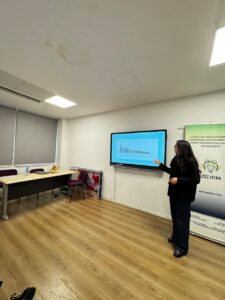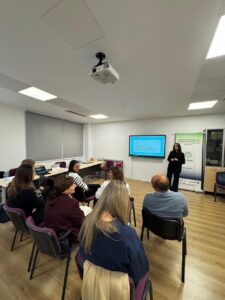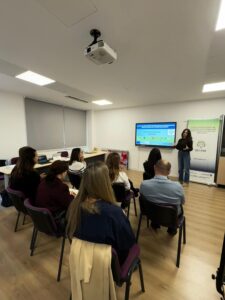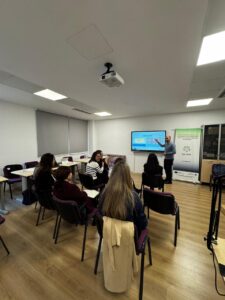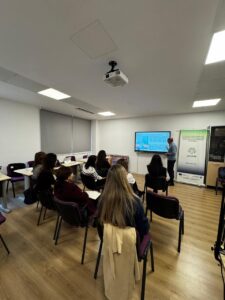Presentations held after the 7th secondment in Croatia by UT
On 7 November 2025, the Faculty of Economics at the University of Tirana hosted a series of professional presentations following the secondment carried out in October 2025 in Samobor and Zagreb. The presentations, organized within the framework of the USE IPM – Up-Skilling Researchers for Sustainable Entrepreneurship Based on Innovation Process Management project, aimed to strengthen research capacities, foster sustainable innovation, and enhance entrepreneurial skills through the exchange of experiences among academic staff and researchers.
- Dimensions of Social Entrepreneurship and Insights from the Zagreb Study Visit
During the study visit to Zagreb in October 2025, academic staff members Dr. Perseta Grabova, Associate Professor, and Dr. Arjan Tushaj, Associate Professor, gathered and shared valuable experiences in the field of social entrepreneurship, focusing on the transfer of knowledge, skills, and best practices within the institution. Their presentation highlighted the importance of evaluating the dimensions of social entrepreneurship in line with the Sustainable Development Goals (SDGs), as well as the need for a deeper understanding of the role of social enterprises in Western Balkan countries, particularly Albania. They emphasized the importance of encouraging new initiatives, ideas, and business models that support social and economic development in developing countries.
- Fundamentals of Entrepreneurship – Creativity, Innovation, and Sustainability
Elona Pojani and Hafsa Laçi delivered a presentation on Fundamentals of Entrepreneurship, emphasizing the role of creativity, innovation, and sustainability in transforming ideas into value. Participants were introduced to various forms of entrepreneurship, the entrepreneurial process, and the importance of building ecosystems that connect scientific research with practical applications. The presentation encouraged researchers to view entrepreneurship as a key driver of sustainable development and positive social impact.
- Promotion of Local Products Through Open Markets – The Case of Samobor, Croatia
Prof. Dr. Brikena Leka and Dr. Klejda Gabeshi presented Promotion of Local Products Through Open Markets: Focus on SMEs and the Case of Samobor, Croatia. The presentation emphasized the significance of open markets as dynamic spaces where tradition meets modern business practices. Using the example of Samobor, they demonstrated how local markets contribute to regional economic development, cultural preservation, and sustainable consumption. Experiences of small producers highlighted the role of innovation, process management, and community-based business models in promoting sustainable entrepreneurship.
- Entrepreneurship and Innovation in Forestry
Kristi Dashi, PhD candidate at the Faculty of Economics, University of Tirana, presented his work titled Entrepreneurship and Innovation in Forestry. The presentation focused on new business opportunities emerging in the forestry sector through technological advancements, including the use of drones, GIS technologies, and artificial intelligence to improve forest monitoring and sustainable management. Special attention was given to the development of the bioeconomy through innovative wood products (such as CLT and bio-based materials), as well as the potential of eco-tourism and recreational forestry. Key challenges in the sector—financing, regulations, climate risks, and workforce shortages—were also discussed, along with recommendations for supporting green startups and strengthening digital skills.
- Zagreb Innovation Center (ZICER) – A Leading Startup Ecosystem
Dr. Eda Spahiu introduced the Zagreb Innovation Center (ZICER), one of the leading startup hubs in the region providing comprehensive support to technology-based companies from the idea stage to growth and scaling. ZICER hosts seven specialized laboratories, including centers for 3D modeling, electronics, IoT, environmental technologies, and the wood industry. In addition to its infrastructure, the center organizes workshops, industry talks, and mentoring programs, offering startups essential knowledge in finance, taxation, sustainability, intellectual property, marketing, and sales. This approach enables ZICER to contribute significantly to the development of competitive and sustainable tech startups.


